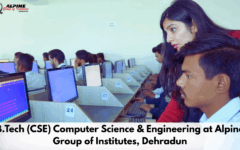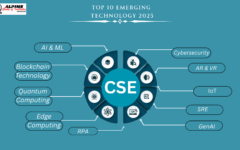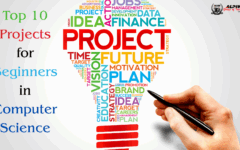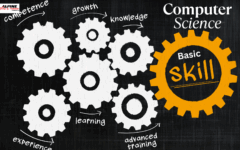Curriculum and Subjects in B.Tech Computer Science (CS)
2024-12-13 6:39Curriculum and Subjects in B.Tech Computer Science (CS)
A B.Tech in Computer Science (CS) typically spans four years and is divided into eight semesters. The curriculum is designed to provide students with a strong foundation in both the theoretical and practical aspects of computer science. It combines core subjects in computer science and engineering, along with electives, laboratory work, and projects that allow students to specialize in various emerging technologies.
Here is a breakdown of the typical curriculum and subjects covered during the course:
Year 1: Foundation Courses
In the first year, the focus is on building a strong foundation in mathematics, science, and basic engineering principles. Students are also introduced to programming and basic computer science concepts.
Semester 1:
- Mathematics I (Calculus and Linear Algebra): Basics of differentiation, integration, matrices, and systems of equations.
- Physics I (Mechanics and Waves): Fundamentals of mechanics, wave motion, and thermodynamics.
- Introduction to Programming: Introduction to programming concepts using languages like C or Python.
- Engineering Drawing: Basics of technical drawing and representation.
- Basic Electrical Engineering: Fundamentals of electrical circuits, devices, and systems.
- English/Communication Skills: Focus on improving communication, both written and oral.
- Environmental Science: Basic understanding of environmental issues and sustainability.
Semester 2:
- Mathematics II (Probability and Statistics): Introduction to probability theory, statistics, and its applications.
- Physics II (Electromagnetism and Optics): Focus on electromagnetism, optics, and modern physics.
- Data Structures and Algorithms: Introduction to essential data structures (arrays, stacks, queues, linked lists) and algorithms.
- Discrete Mathematics: Topics like logic, sets, relations, functions, combinatorics, and graph theory.
- Basic Mechanical Engineering: Introduction to mechanical principles, thermodynamics, and material properties.
- Engineering Mechanics: Study of forces and motions in physical systems.
Year 2: Core Computer Science Concepts
In the second year, students begin to dive deeper into core computer science subjects, including more advanced programming techniques, computer architecture, and databases.
Semester 3:
- Mathematics III (Transforms and Differential Equations): Focus on mathematical transforms (Fourier, Laplace) and solving differential equations.
- Computer Organization and Architecture: Study of computer hardware, memory, CPU, and data representation.
- Data Structures and Algorithms II: Advanced data structures like trees, graphs, heaps, and algorithms to solve complex problems.
- Database Management Systems: Introduction to relational databases, SQL, and database design principles.
- Object-Oriented Programming (OOP): Understanding OOP concepts like classes, objects, inheritance, polymorphism, and encapsulation.
- Digital Logic Design: Study of digital circuits, Boolean algebra, and logic gates.
Semester 4:
- Operating Systems: Understanding operating system concepts like process management, memory management, file systems, and system calls.
- Design and Analysis of Algorithms: Advanced algorithm design techniques such as greedy algorithms, divide and conquer, dynamic programming, and NP-completeness.
- Computer Networks: Introduction to networking concepts, protocols, IP addressing, routing, and network security.
- Software Engineering: Basics of software development lifecycle, methodologies like Agile, and software project management.
- Discrete Structures: Set theory, graph theory, Boolean algebra, and automata theory.
- Microprocessors and Microcontrollers: Introduction to microprocessor architecture and programming, interfacing with peripherals.
Year 3: Advanced Topics and Specializations
In the third year, students start specializing in more advanced topics in computer science, such as artificial intelligence, machine learning, and computer security.
Semester 5:
- Theory of Computation: Study of formal languages, automata theory, Turing machines, and computability.
- Computer Graphics: Introduction to graphics, rendering techniques, 2D and 3D transformations, and graphics programming.
- Artificial Intelligence (AI): Introduction to AI concepts such as search algorithms, knowledge representation, and intelligent agents.
- Software Engineering II: Software design patterns, advanced concepts in software architecture, and testing techniques.
- Compiler Design: Study of compilers, parsing techniques, lexical analysis, and syntax trees.
- Digital Signal Processing (DSP): Basics of signal processing techniques, Fourier analysis, and applications in communications.
Semester 6:
- Machine Learning: Understanding supervised and unsupervised learning algorithms, neural networks, and deep learning.
- Web Technologies: Introduction to web development, HTML, CSS, JavaScript, server-side scripting, and frameworks like Django/Flask.
- Cloud Computing: Study of cloud architecture, cloud service models (IaaS, PaaS, SaaS), and cloud platforms like AWS, Google Cloud, and Microsoft Azure.
- Cybersecurity: Principles of computer security, encryption, authentication, security protocols, and ethical hacking.
- Big Data Analytics: Study of tools and techniques for processing large datasets, Hadoop, and Spark.
- Embedded Systems: Introduction to embedded systems, IoT, and system-level programming.
Year 4: Capstone Projects, Internships, and Electives
In the final year, students focus on advanced electives, project work, and internships that give them real-world experience and prepare them for the job market.
Semester 7:
- Capstone Project: A major project where students apply their knowledge to solve a real-world problem. This could be in areas such as app development, software tools, AI solutions, or web systems.
- Elective 1: Students can choose specialized subjects such as:
- Blockchain Technology
- Data Science
- Virtual Reality
- Mobile App Development
- Elective 2: Another elective choice, often related to industry trends:
- Game Development
- Natural Language Processing
- Robotics
- Ethics and Professional Practice: Focus on professional ethics, intellectual property rights, and legal aspects of software development.
Semester 8:
- Internship/Industry Training: Students typically spend this semester working in the tech industry or with startups to gain hands-on experience.
- Elective 3: A final set of electives to deepen specialization in chosen fields.
- Thesis/Project Work: Finalizing the capstone project or thesis that showcases their understanding of a particular area of computer science.
Key Areas of Focus
- Programming Languages: Students learn and master several programming languages such as C, C++, Java, Python, and often work with frameworks such as Spring, Angular, or Django.
- Data Structures and Algorithms: Understanding how to store, manage, and retrieve data efficiently is central to solving computational problems in any field of computer science.
- Database Management: Practical skills in managing databases using SQL, as well as understanding advanced concepts like normalization, indexing, and distributed databases.
- Networking and Cybersecurity: Study of network protocols, TCP/IP, network security measures, and how to protect data and systems from cyber threats.
- Artificial Intelligence and Machine Learning: Gaining insights into how machines can mimic human intelligence and learn from data, which is one of the fastest-growing areas in computer science.
Conclusion
The curriculum for a B.Tech in Computer Science is rigorous and designed to equip students with both theoretical knowledge and practical skills. By the end of the program, students are prepared for various roles in software development, data science, cybersecurity, artificial intelligence, and more. They are also well-prepared to pursue higher studies or contribute to innovative technological developments in industry.








